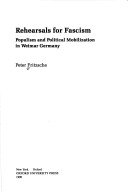One of the most important problems of modern German history is the eclipse of ordinary moderate political parties by "street-fighting" radical right-wing parties in direct conflict with the radical left. This development was largely responsible for the collapse of the Weimar Republic and paved the way for the Nazi seizure of power. Peter Fritzsche's study examines the radicalization of the ordinary German burgher from 1918 to the rise of National Socialism. Combining an examination of life in typical small towns with an analysis of national events and their effects on German political culture, Professor Fritzsche presents a fresh interpretation of the role of the German middle classes in the political life of the Weimar years. He finds that the increasingly populist attitudes of this group were based not only on hostility towards the left, but also towards big business, the Weimar state, and parliamentary democracy itself.
It was this populist sentiment to which the Nazis appealed with such consummate skill: the Nazis did not so much seize power as assume the ambitions and prejudices of the German middle class, while transcending the limitations of their old political organizations.
- ISBN10 0195057805
- ISBN13 9780195057805
- Publish Date 22 March 1990
- Publish Status Active
- Out of Print 4 June 1999
- Publish Country US
- Imprint Oxford University Press Inc
- Format Hardcover
- Pages 311
- Language English
